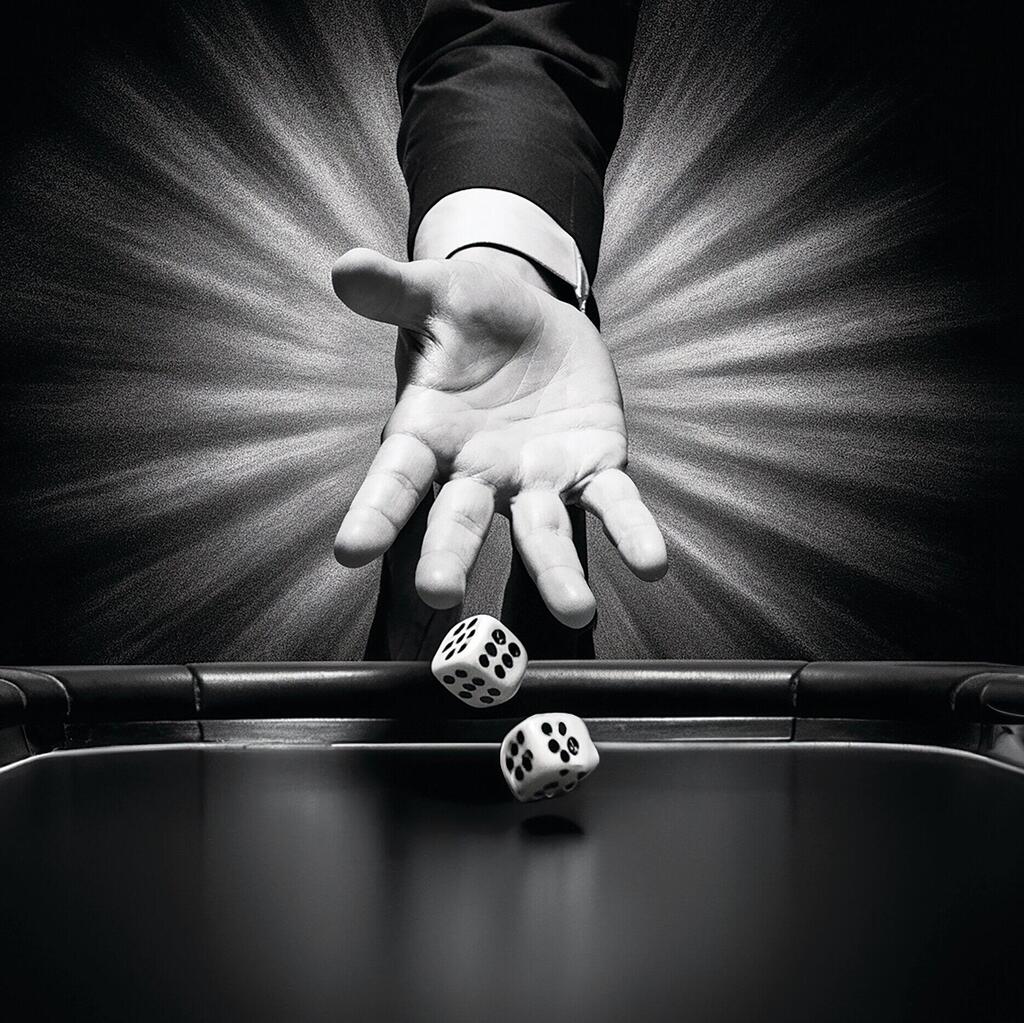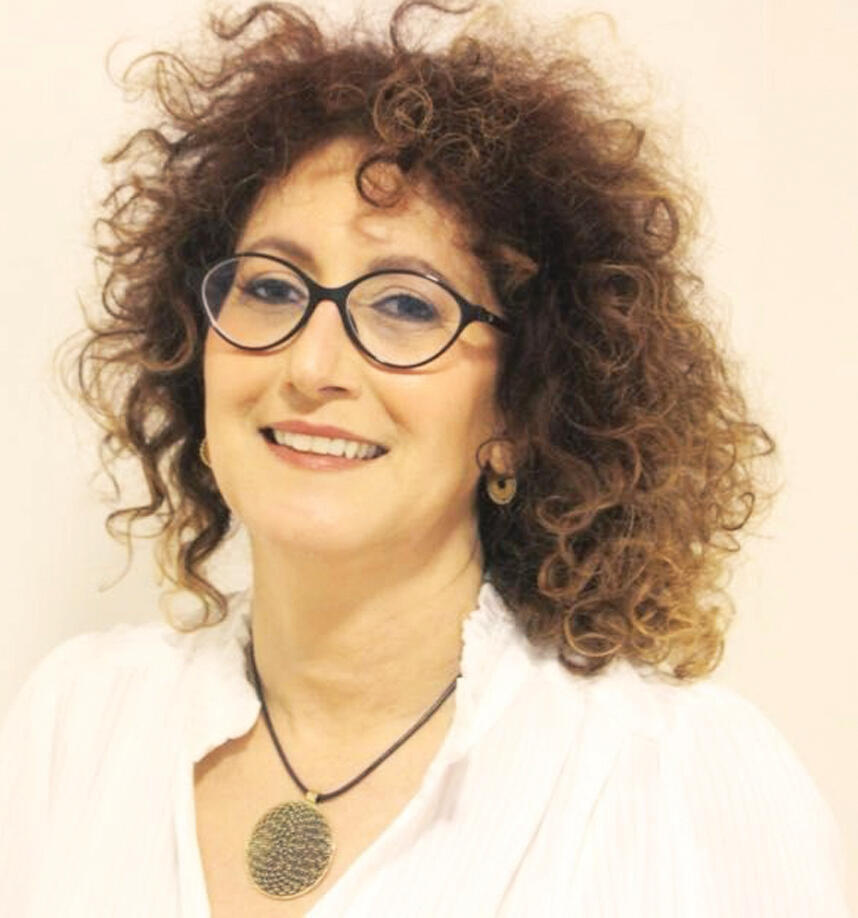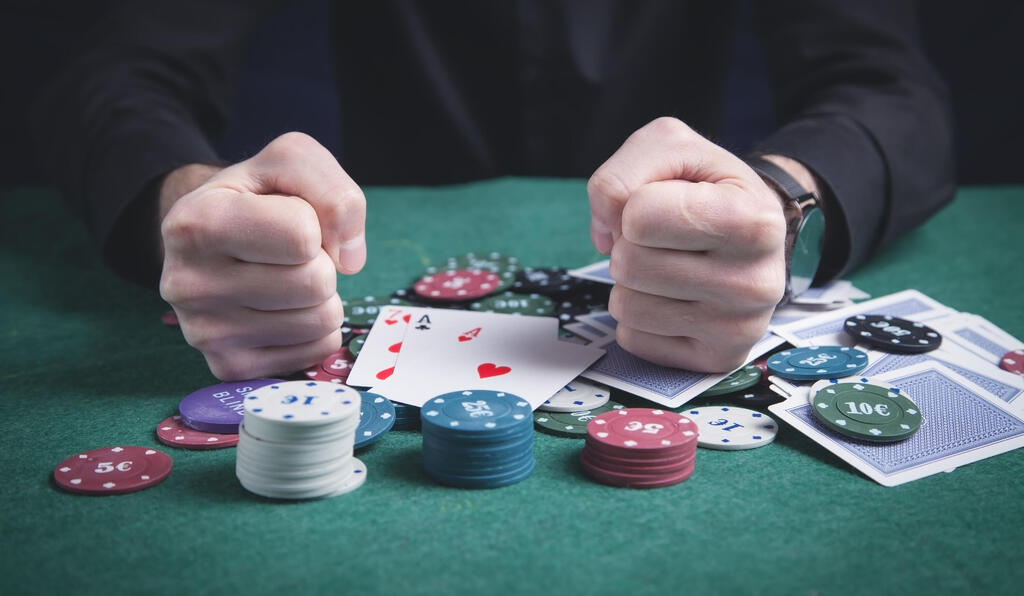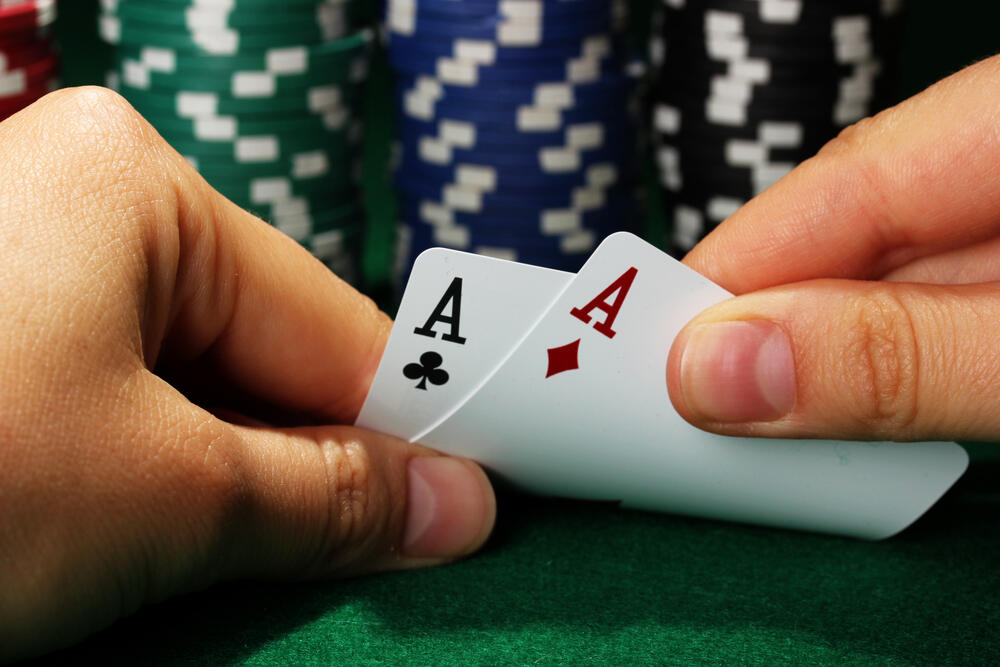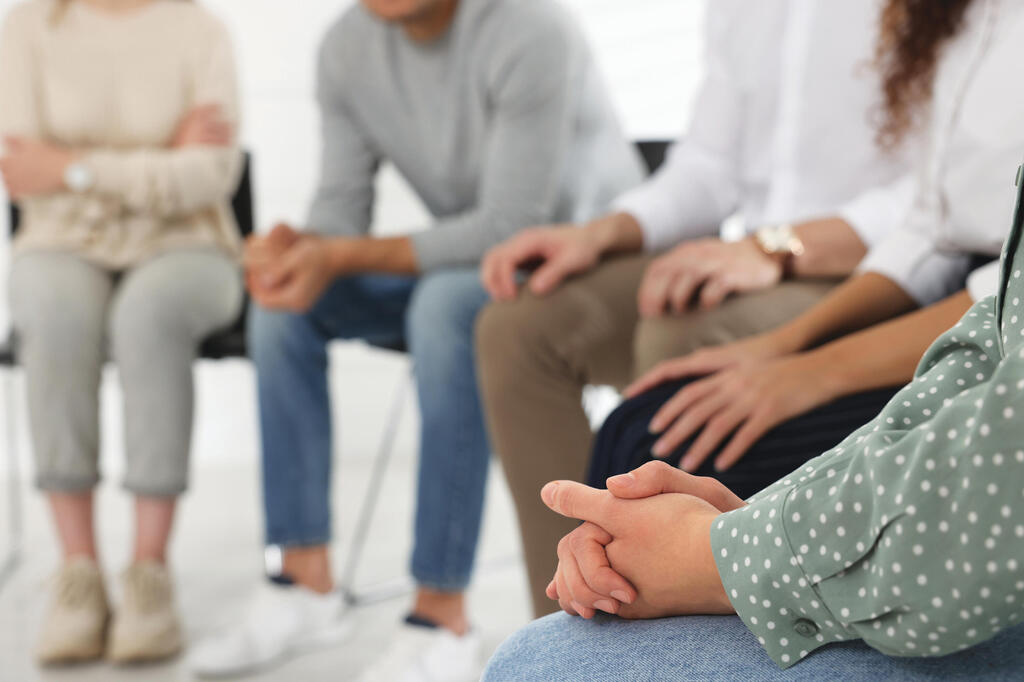The sound of singing coming from the end of the corridor made me think that I reached the wrong place, but all the other rooms in the community center located in central Israel, were locked. "Yes, you've reached Gamblers Anonymous", nodded the man I sat next to who went back to singing.
Once the singing was over, the attendees recited the Serenity Prayer – "God, grant me the serenity to accept the things I cannot change, courage to change the things I can, and wisdom to know the difference" - and the sharing session began.
"My name is Jackie and I'm an addict." "We love you Jackie", the participants reply. "It's been four months and three days since I stopped gambling. To tell the truth, I barely manage to survive. I constantly experience a storm of emotions, being sad, angry, confused, lost. Even when I feel good, I'm not well - because why would I be? I don't deserve it. I'm not good at anything. All I do is mess things up. I don't have a credit card, I can't withdraw money from ATM, I don't even have 20 shekels ($5) in my pocket, because I know that if I had, I would spend it gambling.
"Today, every shekel I earn is used to pay off my debts. I don't have control over anything, and I don't want to control anything - because everything I control - I ruin. It's been that way all my life. Earlier this week I went to give checks to my ex from whom I stole money, and I realized that now she is dating someone I know from my gambling period. And although deep in my heart I let her go, it's still hard. Everything is hard." he says quietly, gently, as if to himself. "Keep on coming," say the attendees.
"In this room you don't feel good all the time," Orna tries to encourage him, "but feelings are not facts and thoughts are not facts - they are constantly changing. Don't get stuck on them, they are not the truth. I believe in you. You can do it. I'm Orna and I'm an addict, I've been clean for six years and a week." I grew up in a wonderful home", she says, "it had everything, except for love. I was a princess, but no one asked me how I was doing, so I looked for love and emotion elsewhere."
She became an addict after retiring from her job in nursing. On a trip abroad, she entered a casino, and from that moment on everything quickly deteriorated into a loss of control of epic proportions: she lost her pension, her savings, her apartment; then she would steal, get caught and arrested; she got addicted to sedatives, to shopping, to toxic and violent relationships – while all this time she was gambling. No one knew. "There are days when the past overwhelms me," says Orna, "all the bad memories flash in my head - the shame, the guilt, the lies. An addict," she concludes, "lives the past, thinks about the future and screws up the present. An addict is a dead man walking. No one can understand an addict - not their family, not friends – but other addicts."
5,000 shekels per month on average
Jackie and Orna, like all the other gambling addicts mentioned in this article, are fictitious names. The details of their personal stories were also changed. The only condition for entering a meeting of Gamblers Anonymous is maintaining the participants' anonymity, which allows complete honesty and exposure. Never in my life have I been in a place so sincere, so genuine, so devoid of defensiveness, lies and excuses, as in this room located at the end of the corridor in the community center. It's as if everyone who enters this room sheds not only their last name and armor of everyday life, but also their very skin, exposing their inner soul with all the shortcomings, scars and flaws - and they know that no one here judges them, no one dismisses them and no one will disclose anything. There is absolute trust.
I'm quite ashamed to be here, yet I find myself a little envious, not of the addiction ilness that crushed them to the core and brought them here, often against their will, but of the spiritual fellowship created in the room and of the redemption that they get to be a part of.
"Addiction is a bio-psycho-social phenomenon," says Prof. Belle Gavriel-Fried, Head of the Addictions and Recovery lab at the School of Social Work at Tel Aviv University. "The biological factor shows a dopamine deficiency in the brain (a neurotransmitter that makes us feel good), and the person seeks reward; the psychological factor involves low self-esteem, a tendency to depression, anxiety, and more. The social factor relates to the availability of the gambling, the drug, etc. The combination is critical. People who have the biological and psychological predisposition and are in an environment that 'supports' addiction - are at risk."
In other words, addiction - any addiction, including gambling - is not a moral defect or a character weakness. It is a disease, and a rather complex one, involving the brain, the mind, and the entire society.
This month, Prof. Gavriel-Fried, together with Dr. Noa Vana, a medical anthropologist, and Amit Loewenthal (economist, Head of the research team at the Israeli Institute for Economic Planning, and a senior researcher at the Institute for Economic Policy, Reichman University), published the first study of its kind in Israel titled "Gambling behaviors in Israel 2023". This is an epidemiological, scientific, in-depth and comprehensive study based on a representative sample of Israeli society. It included approximately 4,000 individuals, both from the general population and from among gamblers.
The finding that emerges from the 167-page study is worrying. Although the prevalence of Israeli gamblers is relatively low - less than half of Israelis gamble at least once a year - compared to about 70 percent in other countries, the percentage of Israeli individuals experiencing gambling problems emerged as relatively high, at approximately 16.7% of the total population of Israel, which means one in six Israelis.
The percentage of gambling addicts in Israel is also high compared to other countries. According to Gavriel-Fried's research, the percentage of problem gamblers in Israel is 1.3 (according to other studies it is even higher - 2.3%), while in the world it ranges from 0.5% to 1%. Further, while 2-3% worldwide were classified as moderate-risk gamblers, in Isarel it is 5%, "which is a lot", says Gavriel-Fried.
The picture worsens even more when taking into account that, unlike many countries, Israel has no casinos and the legal gambling market is regulated and more conservative - and yet, our gambling prevalence is higher. "We may gamble less, but we become more addicted," says Prof. Gavriel-Fried.
And if, according to the above data, Israeli society is in a gambling problem - then it only gets worse when you realize that although the study of Prof. Gavriel-Fried was dated in December 2023, it does not include Israel after October 7, except for one stressful comment appearing in the introduction: 'This report was written in the days when Israeli society is coping with its greatest national trauma in the last 50 years. Studies have shown that problem gambling is associated with trauma and post-traumatic stress disorder (PTSD), suggesting that more Israelis may turn to gambling to cope with depression, anxiety, and stress.'"
Another study led by Gavriel-Fried with Dr. Vana, conducted on U.S. military veterans, shows a higher prevalence of gambling problems among them compared to the general population. "I guess that we are not much different," says Prof. Gavriel-Fried.
As mentioned, even before the war the situation was not favorable. According to the study, about 400 thousand Israelis (410,078 men and women to be exact) are moderate-risk and problem gamblers. If you add it to the low-risk gamblers - about ten percent of the population, some of whom may become problem gamblers - you already exceed the figure of one million Israelis. These are the highest estimates given so far.
According to the study, gambling was more common among males, young adults, individuals with lower income, Israeli-Arabs (despite lower rates of involvement in gambling among Arabs, more Arabs were classified as at-risk gamblers compared to the Jewish population); at-risk gamblers typically resided in more peripheral areas, they tended to engage more in smoking, alcohol drinking, and on average they reported more symptoms of depression, anxiety, stress and a host of other difficulties.
If a casual Israeli gambler, who is not at risk, spends on average 240 shekels per month on gambling (with a median spending of 20 shekels per month) - the gamblers at risk spend an average of about 5,000 shekels per month (the median outlay is about 1000 shekels). About a fifth of them frequently used their National Insurance Institute allowances for gambling. In addition, many of them engage in illegal gambling. And illegal gambling, allegorically, is like 'Hotel California' – 'You can check out anytime you like, but you can never leave'. This is also how one most likely and quickly will meet new friends from the criminal world and the gray market.
There is no exact estimate of the illegal gambling market, but according to the most conservative estimates, the annual revenue is estimated at about NIS 20 billion, more than the combined revenue of the regulated lottery and Toto sports betting (about NIS 14 billion). And even if it is likely that Mifal HaPais (Israel's government-owned lottery company) and the regulated Lottery industry take advantage of the gamblers' weakness and are more common among poorer communities – they at least make some effort to prevent gambling among minors, they monitor problematic behavior online, they suspend and close stations that sell lottery to minors, they support rehab associations, they finance researchers on the subject, they stream tens of millions of NIS to the public treasury, and above all, they prohibit gambling with money that gamblers do not own, as opposed to illegal gambling networks that offer high interest loans.
Mifal HaPais' response: "For over a decade, Mifal HaPais, in cooperation with the Ministries of Welfare, Health and Finance and other associations, has been leading a policy of 'responsible gaming', within which it allocates budget to information, prevention and training, to prevent addiction and provide treatment to addicts. It also participates in the establishment of rehab centers for addicts, including the establishment of a national center on addictions at the Hebrew University.
"Since October 7, professionals in Israel have been pointing to an increase in addiction in all forms, and as a result the Lottery has recently initiated a campaign of Invitation to Tenders of five million shekels destined for unique projects of resilience, treatment and prevention of addictions. In addition, we will soon launch a broad media campaign to increase awareness."
Response of the Toto (Israel's regulated sports bets): "At Toto, we do not see an increase in the number of players since the onset of the war. However, we do identify an increase in registration requests from minors to the site. Toto operates an online identification and filtering system, as well as an array of hidden inspections at the points of sale. Only recently, a station was closed after it was caught selling to a minor in the amount of ten shekels."
A large increase in the number of women who become addicted
To try to characterize the situation of gambling addictions since October 7, I turn to Prof. Shauli Lev-Ran, Co-founder and Academic Director, The Israel Center on Addiction (ICA). If after the COVID-19 pandemic, the ICA stated that about one in ten Israelis was suffering from some type of addiction disorder, then according to Lev-Ran, as of October 6, one in seven Israelis struggled with the addiction. Today, he says, one in four Israelis have increased their addictive substance use or addictive behaviors. "When the war started we were in a bad situation - and now it's gotten worse," Lev-Ran warns.
At the end of 2023, three months after the onset of the war, the ICA conducted a study showing a dramatic increase of 20% in addictive behavior among gamblers at increased risk. From 5% of the population in the days before the war, as indicated by Gavriel-Fried's research, to 6.3% of moderate-risk and problem gamblers. "Participants who reported an increased engagement in gambling also reported higher levels of post-traumatic symptoms, anxiety and depression," it said.
The center also made a comparison between those who were exposed to traumatic events and those who were not. "For those who were directly exposed to the trauma (of October 7), the likelihood of gambling at an increased risk was significantly higher," says Prof. Lev-Ran, "those who were exposed once a week or more to harsh footage in the media – were at an increased risk of problem gambling compared to those who were not exposed."
In addition, 50% of individuals who were closer to the trauma on October 7 reported excessive use of addictive substances. Currently, the ICA is analyzing research conducted in March 2024. No data is available yet, but it doesn't look good.
Do you see this increase also at the clinic?
"I see an increase in everything. Since the war, there have been many more applications to the center, a higher prevalence of addiction, a rise in the use of prescription drugs, and in certain age groups there is a noticeable increase in the consumption of alcohol, cannabis and porn. We are also starting to identify the later wave, of those who made efforts by seeking professional support, but now they are wearing out."
"In addition to anxiety and depression," says Lev-Ran, "increased risk gambling is also associated with suicidal ideation, often due to having financial debt and guilt. It is necessary to detect the problem early, carry out initial intervention, and refer the individual at risk for treatment when necessary. Attention must be paid to the increased risk."
The large Israeli associations "Efshar" and "HaDerech", which operate treatment centers for gambling victims, inter alia, also report an increase in inquiries as well as a sense of crisis. "It's important to understand that gambling has a very big delay", says Nahum Michaeli, director of the unit for the treatment of alcohol and gambling victims at the "Efshar" association. Drug addiction can be identified quite quickly, whereas gambling, is a 'silent drug', it takes time to notice. Gamblers know how to hide their situation from others. The increase in the gambling addiction rate will not be seen tomorrow - it will take time to emerge."
You have been working in the addiction field for 54 years. What is your perspective?
"I notice two things. One, there's a large increase in women who become addicted, to alcohol, gambling and drugs; second, addiction begins at a younger age. The availability online encourages this."
"We are a 'Dopamine Nation,'" says Dr. Amnon Michael, CEO at HaDerech organization that provides treatment to a variety of addictions, and director of MILA - the Israeli Gambling Addiction Treatment Center. "Gamblers need to gamble with increasing amounts of money, and variety of games, to achieve the desired excitement and to increase dopamine levels. Gambling is available all the time and everywhere. It's a difficult and complex problem. We are a gambling society, looking for thrills."
He also identifies addiction prevalence at a younger age as well as an increased incidence since the onset of the war. "Gambling also overlaps other addictions. The disease develops a mutation. As the number of people, the number of passions."
Gambling addiction, Michael says, is more similar to drug and alcohol addiction than, say, shopping. "Every addiction is triggered by pain and causes pain. Most addictions are related to trauma and communication problems. A person has no one to rely on but himself, and when he cannot rely on himself, he relies on the addiction."
At what point does a habit become an addiction?
"The transition from dependence to addiction is gradual. Like cucumbers that do not turn into pickles in one day, but pickles can never go back to being regular cucumbers. When addiction occurs, it is difficult to turn back the wheel. It becomes a disease, which may not be cured, but it can be treated and managed."
I hated my child
Back to the Gamblers Anonymous (GA) meeting. In the center of the meeting tonight: Michael, 31, is celebrating his first year of abstinence from gambling. For the occasion he invited his mother and girlfriend. "Ever since I was a child, I was drawn to Toto (football betting) stations," he says. "They liked me there, I was their mascot, they would let me pick numbers and bet. When they won, they would give me money. I would go to the station every day after school, and often instead of school. Very quickly I started betting myself, whenever I got into trouble my father paid off my debt. From there I deteriorated to illegal gambling, which is hell. I would constantly get gray market loans."
He talks in detail about the sophisticated debt settlement method he developed - how much resourcefulness and how much energy are required from an addict to feed the addiction! "I couldn't stop," he says, "in my head I believed that here, I would win it all, but instead of winning, debt collectors started arriving at my parents' house, and then everything exploded."
His mother is telling her side of the story; she talks about the years of lack of sleep, how scared she was with every sound of knocking on the door, or every motorcycle driving down the street. She talks about the many years she's been drawn into the abyss of her child's gambling. "I hated my child," she admits. "I was furious with him. All our savings were used to pay off his debts, we gave up all our dreams. But more importantly, all these years I could not afford spending time with my other children, my friends, my husband, I didn't have time for myself - everything was about him and surrounded him. To this day it's hard for me to trust him and I don't know if I ever will. Michael is a good boy", she says, "I know he is a good boy, but he is sick. This illness will not leave him, it is present all the time, before he wakes up in the morning and after he goes to sleep at night."
By the look in the eyes of the attendees, it seems that everyone is thinking about their spouses, their parents, their children, their friends and all the pain they have caused to others. Everyone having their personal memories, everyone thinking about their misdeeds. You can see how the pain they caused to others acts like a boomerang.
Prof. Gavriel-Fried's research also deals with a population that is severely affected by the addiction without buying a single lottery ticket: the gamblers' family members. One out of nine Israelis reported about a family member who engaged in too much gambling. They reported emotional damage, helplessness, failure, guilt, loneliness, shame, harming the family structure - and many financial difficulties, especially in the case of spouses who used their savings for gambling, and often lost everything. Just imagine the stress caused by a debt collector in the size of an industrial refrigerator knocking on your door. Family remembers of gamblers at risk are the transparent victims of the gambling problem in Israel. The solution they are given is only partial.
"My name is Daniel and it's been four years and 18 days since I stopped gambling. I come from a family of addicts. I saw the suffering at home but didn't understand it. At the age of 16 I was exposed to the game of cards, and everything deteriorated from that moment on. I would gamble everywhere. I got into trouble with the gray market. I owed more than 1.5 million shekels to three criminal organizations. When they were looking for me at home, I was kicked out of my family for three years. I stopped gambling for a while out of fear, but I returned gambling very quickly, at first with small amounts, but you know how it goes."
He doesn't need to elaborate, of course they know.
"I gambled for 25 years," says Daniel, "and the truth is - I didn't want to quit. One evening, after a big loss, my father-in-law said to me: 'Either I crush you - or you quit.' I came here because I wanted to please others, but I stayed because I wanted it myself. The group taught me how to tell the difference between right and wrong, how to manage my feelings – and what it's like to feel in general. When you gamble, you feel nothing. I feel that I managed to break free, deep in my soul, from gambling. I wouldn't have pulled it off without the group."
"Gamblers Anonymous" has been operating in Israel for about 20 years, and about a thousand addicts participate in meetings. A drop in the ocean. In general, all studies came up with the same results: only a small number of addicts seek treatment. Aharon Shabi, director of the Addiction Treatment Service at the Ministry of Labor, Welfare and Social Services, says that out of the hundreds of thousands of addicts in Israel, the Ministry of Welfare caters to a total of 13,000 people, of which about 800 are gambling addicts. The Ministry of Health does not treat addicts. And even if we take into account the support provided by all the associations, we will only reach about 3,000 patients out of hundreds of thousands of addicts. It's a fraction.
Shabi also identifies an increase since the onset of the war. "In an examination, we performed five months ago, we saw an increase in people who experienced a crisis, which mainly involved addiction to prescription drugs, alcohol and cannabis, but also to gambling."
As the evening progresses and the stories unfold, I realize what is happening to me, or rather remember what I don't like to be reminded of: I also have a weakness for gambling. I am one of them. I'm far from being an addict, but the demon is inside me, dormant. I had several episodes where I lost myself in gambling, mostly horse racing betting, and there were also casino visits that got out of control. Luckily I'm a coward. And yet, during the work on this article I felt the demon awakening, stretching. I entered the Toto sites, I visited the Mifal HaPais Lottery stations, I looked at the illegal sites - and slowly the whisper turned into a growl and the growl into a roar: Go Gamble! The stories of horror and pain of the addicts really deterred me, but nevertheless attracted me like sirens calling me from the abyss. So, I ended up buying a ticket, scratched a card, filled out a Toto bet form, lost some money and calmed down the demon, until next time. Demons, I have already learned, always sleep with one eye open.
First published: 05:06, 08.24.24


